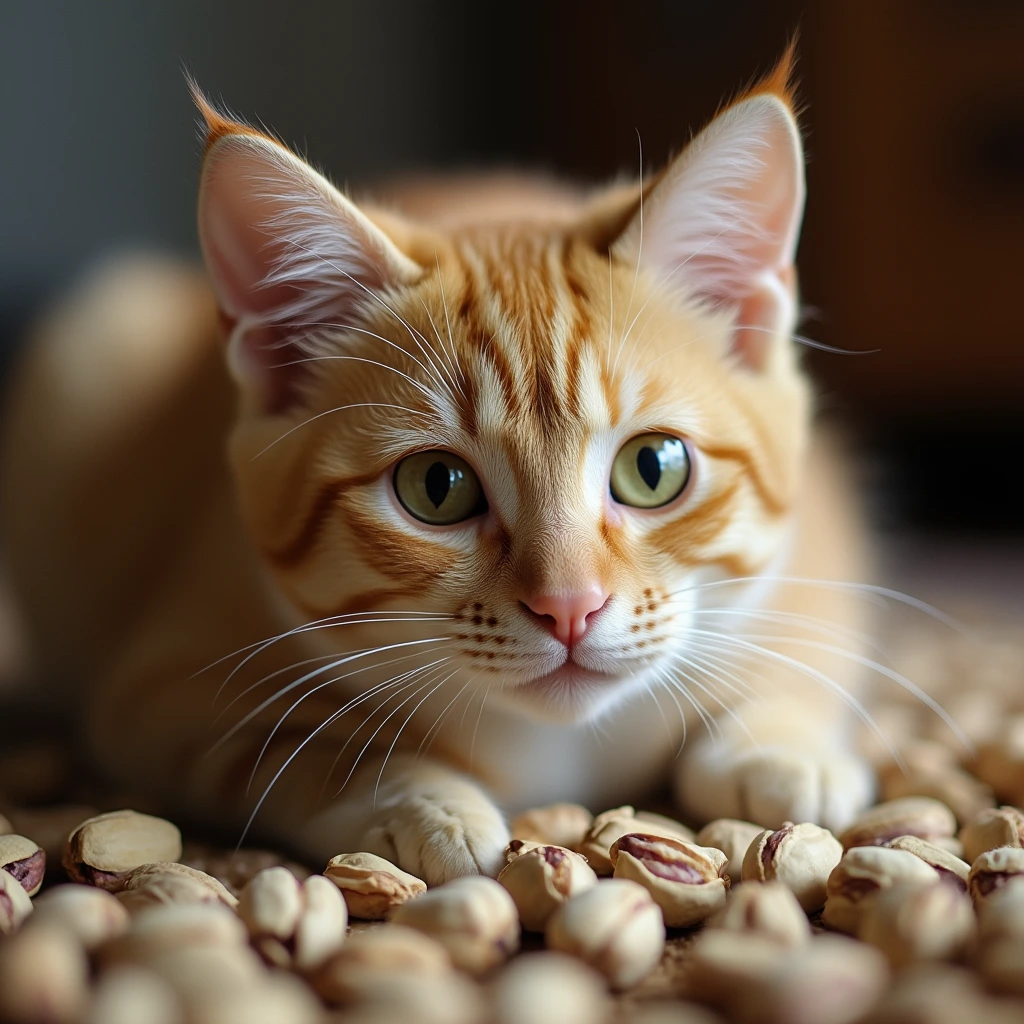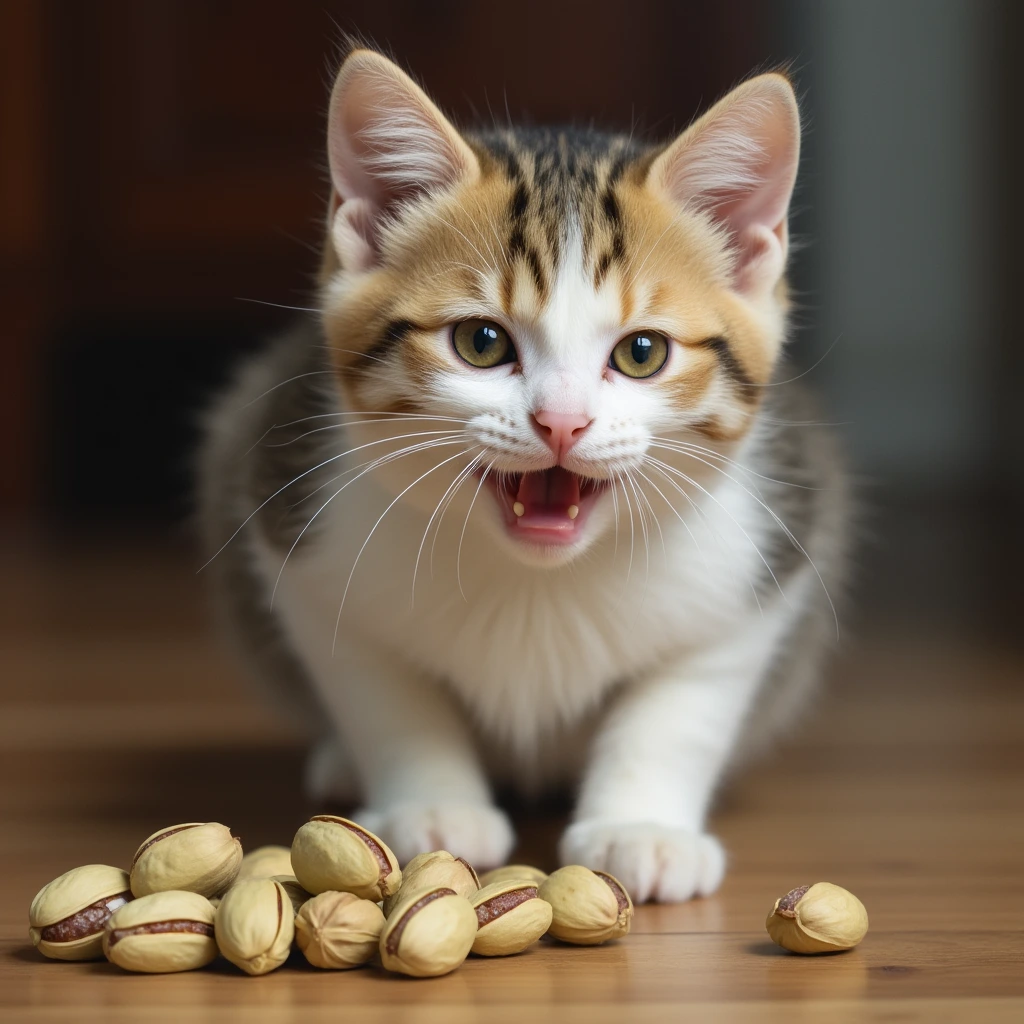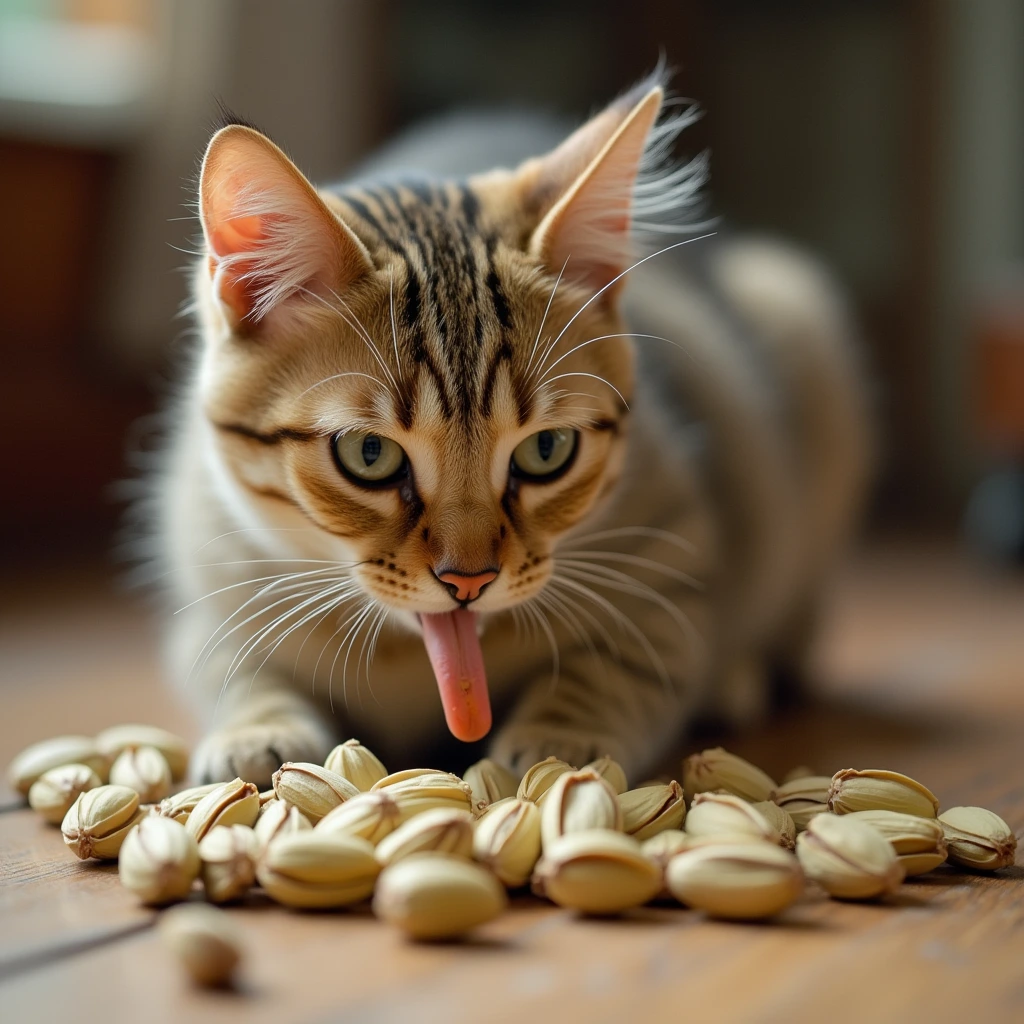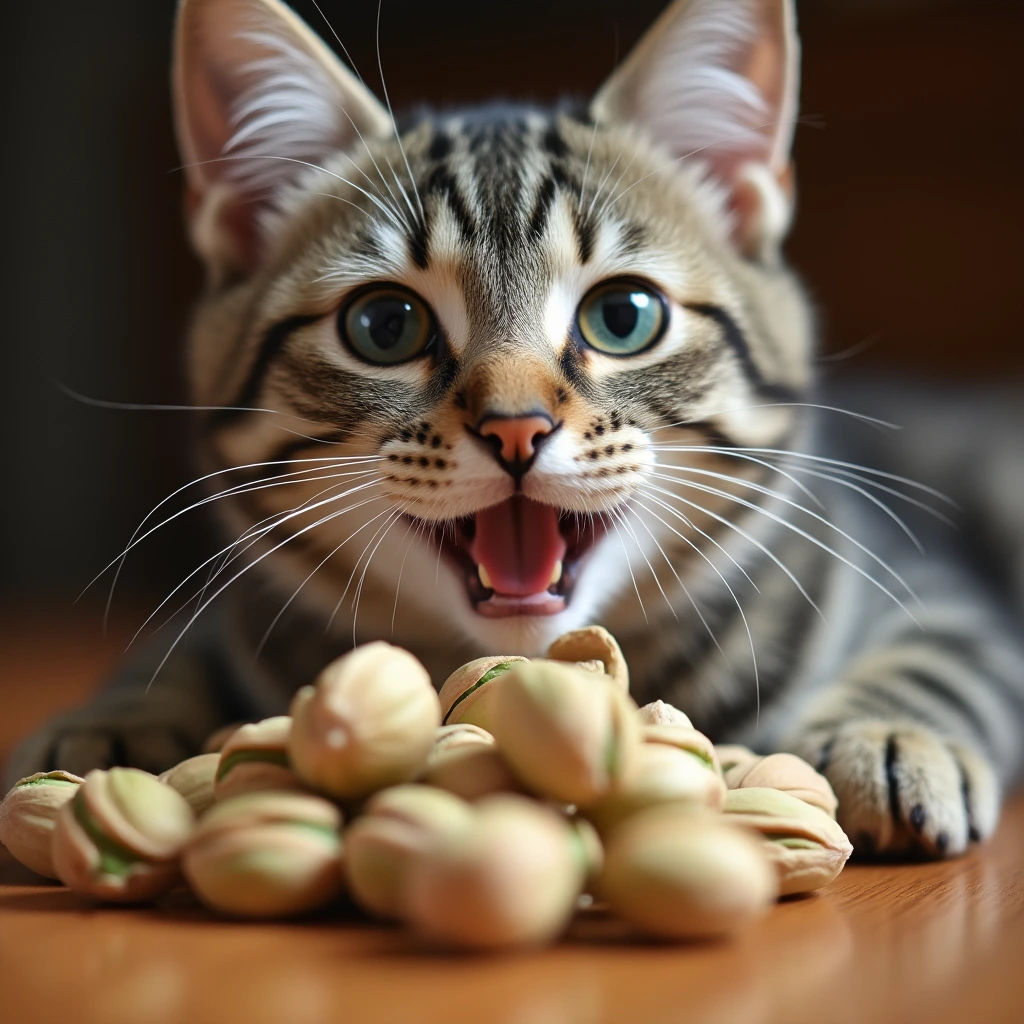As a pet parent, you know that curious look your cat gives you when you’re enjoying a snack. One minute, you’re cracking open pistachios, and the next, your furry friend is begging for a taste. Sharing is caring, right? Well, not so fast. When it comes to feeding cats human food, it’s important to know what’s safe and what’s not. So, can cats eat pistachios? Let’s dive into the facts and figure out whether this nutty treat is one your feline friend should enjoy.
Table of Contents
Are Pistachios Safe for Cats to Eat? – can cats eat pistachios?
The short answer is that pistachios are not safe for cats to eat. While they may not be toxic, that doesn’t mean they’re harmless. Pistachios, like many nuts, pose a number of potential risks to your cat’s health. From their high-fat content to their potential for causing choking, these little green nuts should be kept far from your pet’s reach.

Why pistachios aren’t ideal for cats:
- High-fat content: Cats don’t process fats the way humans do, and consuming high-fat foods like pistachios can lead to digestive upset, obesity, and even more severe conditions like pancreatitis.
- Salt: Many store-bought pistachios are heavily salted, and too much sodium can lead to dehydration, increased blood pressure, or kidney problems in cats.
- Choking hazard: Pistachios, especially when unshelled, can be a serious choking risk for cats. Even a small piece can get lodged in their throat or intestines, leading to potentially life-threatening blockages.
As tempting as it may be to share your snacks, it’s best to keep pistachios off the menu for your feline friend.
Nutritional Value of Pistachios and How They Affect Cats – can cats eat pistachios?
From a nutritional standpoint, pistachios have very little to offer cats. Cats are obligate carnivores, meaning their bodies are designed to digest and use animal-based proteins. While pistachios are rich in plant-based protein, fiber, and healthy fats, these nutrients do not benefit cats in the same way they do humans.
Let’s break it down:
| Nutrient | Amount per 1 oz | Why It’s Harmful for Cats |
|---|---|---|
| Fat | 13g | Can lead to obesity and pancreatitis |
| Sodium | 121mg | Risk of dehydration, high blood pressure |
| Fiber | 3g | Cats get no real benefit from fiber |
| Protein | 6g | Cats need animal-based protein for proper nutrition |
For a cat’s small digestive system, foods high in fat, like pistachios, are difficult to break down. Regularly consuming high-fat foods can lead to long-term health issues such as weight gain and even liver problems. Plus, the salt content in many roasted or flavored pistachios is another red flag. Even in small amounts, the sodium can be harmful to your cat’s kidneys and cardiovascular system.
Potential Risks of Feeding Pistachios to Cats
Beyond the basic nutrition concerns, there are several risks associated with giving pistachios to cats. While it’s unlikely that a single pistachio will cause major harm, even small amounts can lead to problems if consumed over time.
Common Risks:
- Choking Hazards: The size and shape of pistachios, especially with their hard shells, make them potential choking hazards for cats. Cats are not designed to chew nuts thoroughly, which increases the risk of a piece becoming stuck in their throat or intestines.
- Salt Toxicity: Salted pistachios can lead to sodium ion poisoning in cats, causing symptoms like vomiting, diarrhea, seizures, and even death in severe cases. Cats are particularly sensitive to salt because their bodies are not built to process it in high quantities.
- Digestive Issues: The fat content in pistachios can cause digestive upset, including diarrhea and vomiting. Over time, regular consumption of high-fat foods can also contribute to pancreatitis, a painful and potentially fatal inflammation of the pancreas.

Symptoms of Pistachio Poisoning:
If your cat has eaten pistachios, watch for these symptoms:
- Vomiting
- Diarrhea
- Lethargy
- Increased thirst or urination
- Tremors or seizures (in extreme cases)
If you notice any of these signs, it’s crucial to contact your veterinarian immediately for advice.
What to Do If Your Cat Eats Pistachios
Accidents happen. If your cat managed to sneak a pistachio when you weren’t looking, here’s what you should do:
- Assess the Situation: How much did your cat eat? Was it just a nibble, or did they manage to gobble down several pistachios? Also, check if the pistachios were salted or flavored.
- Watch for Symptoms: Keep a close eye on your cat over the next 24 hours. Look for any signs of digestive upset (vomiting, diarrhea), lethargy, or behavioral changes.
- Contact Your Vet: If your cat shows any symptoms of distress or if they ate a large number of pistachios, call your veterinarian right away. It’s always better to be safe than sorry.
- Remove the Source: Make sure to store pistachios and other human snacks in sealed containers out of your cat’s reach to prevent future incidents.
Safe and Healthy Alternatives to Pistachios for Cats
While pistachios may not be a safe treat, there are plenty of cat-friendly alternatives that are both healthy and enjoyable for your feline friend. Cats have different dietary needs than humans, and their snacks should reflect that.
Vet-Approved Cat Treats:
- Cooked Chicken or Turkey: A small piece of plain, cooked chicken or turkey is an excellent high-protein treat that aligns with a cat’s carnivorous diet.
- Freeze-Dried Meat Treats: Freeze-dried beef, salmon, or chicken treats are a great way to give your cat a high-protein snack without any harmful additives.
- Catnip: Some cats love the smell and taste of catnip. This natural herb is safe and even offers some health benefits, like encouraging play and exercise.
Remember, moderation is key. Even safe treats should only make up a small part of your cat’s overall diet to prevent overeating or nutritional imbalances.
How to Create Safe Homemade Cat Treats
If you prefer a more hands-on approach to your cat’s treats, homemade options can be a great way to control what goes into their snacks. Here’s a simple recipe that’s both delicious and safe for your feline friend.
Homemade Chicken Cat Treats
| Ingredients | Amount |
|---|---|
| Cooked chicken breast | 1 cup |
| Egg | 1 |
| Cat-safe herbs (optional) | A pinch |
- Preheat the oven to 350°F.
- Blend all ingredients until smooth.
- Shape the mixture into small, bite-sized pieces.
- Bake for 10-15 minutes or until golden brown.
These treats are high in protein and free from harmful additives, making them a perfect option for your cat.


FAQs About Cats and Pistachios
Can cats have a small amount of pistachios?
In very small quantities, pistachios are unlikely to cause severe harm. However, due to their high-fat content and potential salt levels, it’s best to avoid feeding pistachios to cats altogether.
Why are pistachios bad for cats?
Pistachios are bad for cats because they contain fats and salts that can be harmful. Additionally, the nuts pose a choking hazard and offer no nutritional benefits to cats.
Can cats eat other nuts?
Most nuts, including almonds, walnuts, and cashews, are not suitable for cats. They share similar risks to pistachios, such as high-fat content, choking hazards, and the possibility of salt or seasoning that could harm your cat.
Conclusion: Is It Worth the Risk? can cats eat pistachios
So, can cats eat pistachios? While these tasty green nuts might be a healthy snack for you, they’re far from ideal for your feline companion. From choking risks to high fat and salt content, pistachios can cause more harm than good for your pet. It’s always best to stick with treats that are specifically formulated for cats, ensuring they get the nutrients they need without any dangerous side effects.
If you’re ever unsure about what’s safe to feed your cat, a quick call to your vet can provide peace of mind. Your cat relies on you to make the best choices for their health, so when it comes to snacks, choose wisely!
can cats eat pistachios can cats eat pistachios can cats eat pistachios? can cats eat pistachios? can cats eat pistachios? can cats eat pistachios? can cats eat pistachios?

